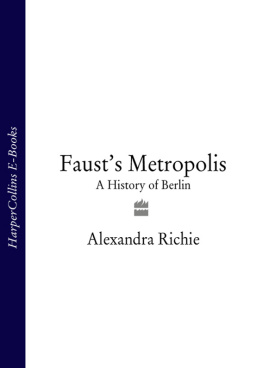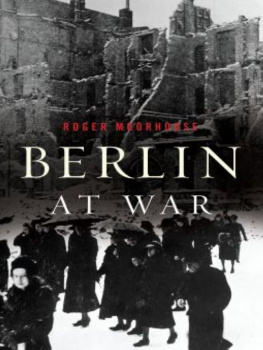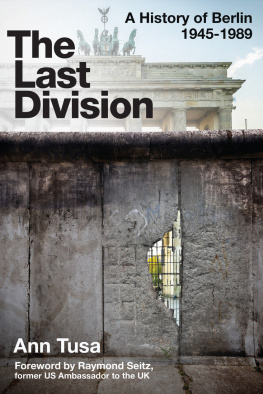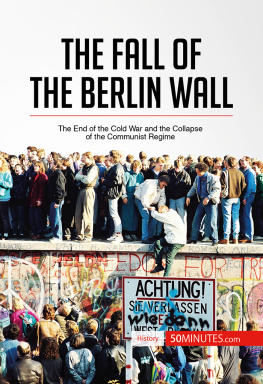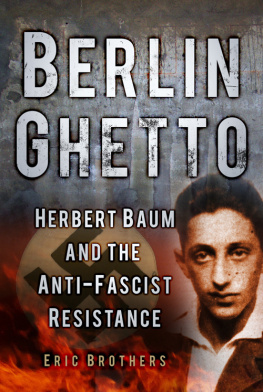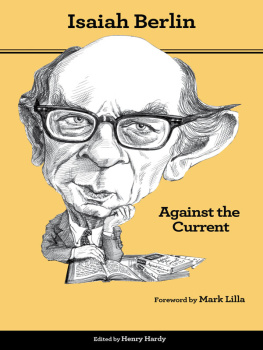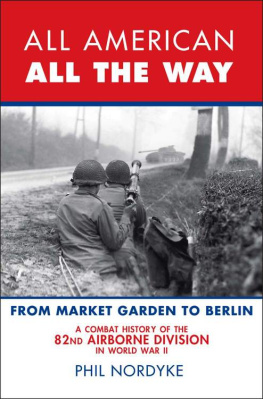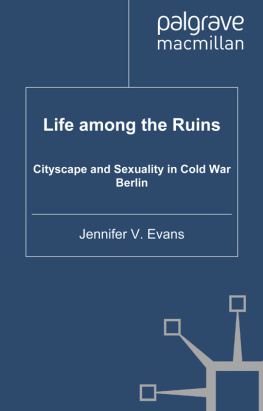Alexandra Richie - Faust’s Metropolis: A History of Berlin
Here you can read online Alexandra Richie - Faust’s Metropolis: A History of Berlin full text of the book (entire story) in english for free. Download pdf and epub, get meaning, cover and reviews about this ebook. year: 1998, publisher: Basic Books, genre: Politics. Description of the work, (preface) as well as reviews are available. Best literature library LitArk.com created for fans of good reading and offers a wide selection of genres:
Romance novel
Science fiction
Adventure
Detective
Science
History
Home and family
Prose
Art
Politics
Computer
Non-fiction
Religion
Business
Children
Humor
Choose a favorite category and find really read worthwhile books. Enjoy immersion in the world of imagination, feel the emotions of the characters or learn something new for yourself, make an fascinating discovery.
- Book:Faust’s Metropolis: A History of Berlin
- Author:
- Publisher:Basic Books
- Genre:
- Year:1998
- Rating:3 / 5
- Favourites:Add to favourites
- Your mark:
- 60
- 1
- 2
- 3
- 4
- 5
Faust’s Metropolis: A History of Berlin: summary, description and annotation
We offer to read an annotation, description, summary or preface (depends on what the author of the book "Faust’s Metropolis: A History of Berlin" wrote himself). If you haven't found the necessary information about the book — write in the comments, we will try to find it.
Faust’s Metropolis: A History of Berlin — read online for free the complete book (whole text) full work
Below is the text of the book, divided by pages. System saving the place of the last page read, allows you to conveniently read the book "Faust’s Metropolis: A History of Berlin" online for free, without having to search again every time where you left off. Put a bookmark, and you can go to the page where you finished reading at any time.
Font size:
Interval:
Bookmark:
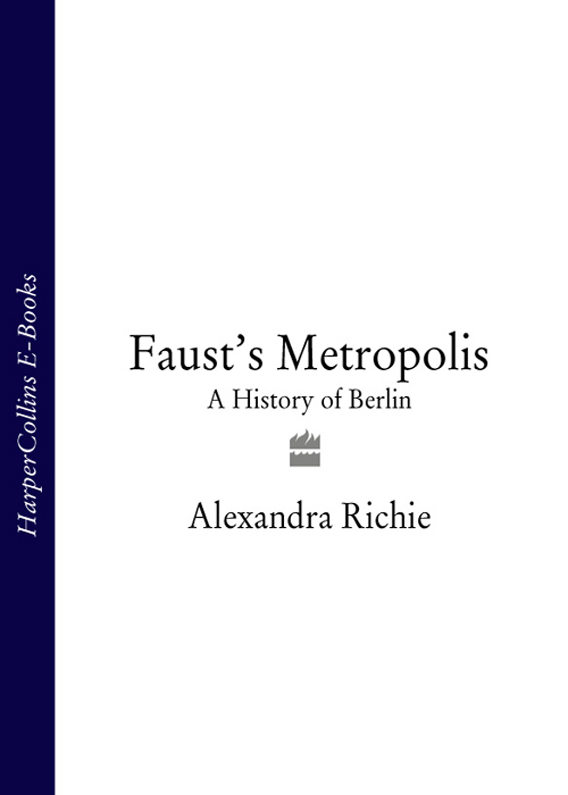
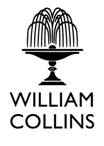
For Wadysaw Bartoszewski
From the moment I first set foot in the city as a young student I became fascinated by Berlin. Like Faust, Berlin can be said to have two spirits in the same breast; it is both a terrible and a wonderful city, a place which has created and destroyed and whose name is both acclaimed and blackened. It is not without reason that Berlin has been called everything from the symbol of German destiny to the city of the twenty-first century. Above all, it is a place where history could not and still cannot be hidden away.
When I first went to live there Berlin was the ultimate border city, representing nothing less than the Cold War division between the Communist and the Free world. It was a capital city and a strange backwater, a centre and a borderland at the same time. The revolution which erupted in 1989 and led to the destruction of the Berlin Wall made it once again the focus of world attention. As I watched the Wall being reduced to rubble I realised that the dramatic changes would raise very disturbing questions about Berlins role in Germany and its function as a symbol in the creation of German identity. Now more than ever it is imperative for us to be aware of the triumphs and the mistakes of its past, as the decisions made in Berlin in years to come will affect us all.
I have tried to write a book that addresses the citys crucial role in world events. It is not a local history, although it has elements of this, but is a history of Germany even of Europe, including the often-neglected east as seen through the prism of Berlin. The book is meant for the general reader. Much of the material is known and its claim to originality lies more in the selection and presentation of information than in new discoveries. I have tried to avoid specialist language and the narrow categories of contemporary historiography, choosing instead to weave various aspects of cultural, social and economic history together with more conventional military or diplomatic approaches into a comprehensive whole. With the exception of the introduction, which brings the story up to date, the book follows a broad chronological framework. Although I cover all periods of Berlins past, the emphasis is clearly on the city in the twentieth century, its role in the First World War, in the Holocaust, in the creation of modernist culture, in the identity of post-Cold War Europe in numerous crucial events of the recent past.
Many people have helped me in the writing of this book. It evolved from the D.Phil which I wrote at St Antonys College, Oxford, and I would like to thank the Warden of St. Antonys, Lord Dahrendorf, and the Fellows of the College, particularly those at the European Studies Centre who have done so much to support my research. I would like to thank the President of Wolfson College, Sir David Smith, and the Fellows of the College for granting me a fellowship and providing the wonderful haven in which I was able to work. Timothy Garton Ash has been a great source of inspiration and I am most grateful to him for recommending me to HarperCollins. I would also like to thank Michael Burleigh for first suggesting Berlin as a topic, and Warren Magnusson and Raymond Klibansky for their help. I am most grateful to the late Sir Isaiah Berlin for persuading me to write history, it is not too much to say that his words changed the course of my life.
HarperCollins has been everything an author could hope for. Michael Fishwick has been an exemplary editor and has patiently guided this project from the beginning; Rebecca Lloyd was not only highly professional but also great fun to work with; both have become friends. I am grateful, too, to Helen Ellis, Stuart Proffitt, Kate Parrish, Annie Robertson, Phyllis Richardson, Sophie Nelson for copy-editing, Phil Lewis for the picture lay-out, Jon Gilkes for cartography and the many others who have contributed to the book.
Literally hundreds of Berliners let me into their lives and helped me to understand their city. Some selflessly showed me their neighbourhoods and took me into their homes; some assisted me in the search for sources, guided me through the archives and answered seemingly endless questions with characteristic good humour. I am particularly indebted to those East Berliners who befriended me before 1989, when such contact put them at considerable risk, and to the rubble ladies who spoke of their post-1945 experiences with candour and courage. I would also like to thank the Boston Consulting Group, and in particular Barry Jones, John Lindquist and Charbel Ackermann, for giving me the opportunity to glimpse at first hand the economic transformation of East Germany after 1989.
I was enormously touched that Gordon Craig, that most respected of German historians and a man whose work I have long admired, took the time to read the manuscript and send comments and corrections, and I thank him for his very kind words. Thanks also to Peter Gay for reading so much and for his very helpful comments, to Harold James for reading the book and sending his very reassuring and insightful remarks, to Norman Naimark for reading the post-war chapters, to Thomas DaCosta Kaufmann for his detailed corrections of the early chapters and to Robert Conquest for, amongst other things, shedding light on the realities of 1930s Berlin. I would also like to thank James Sheehan, Fritz Stern, Max Hastings, Sir Michael Howard and Charles Maier for their comments, advice, and kind words of encouragement.
The writing of this book would have been much less enjoyable without the contributions of my dear friends Victoria Joffe, Levin von Trott zu Solz, Erik Svendson, Marlene Apmann, Stephen Pettyfer, James Allison, Margaret Craig and Serguisz Michalski. I am grateful to the many members of my extraordinary extended family around the globe who have done so much, and I owe a special debt to my father-in-law, Wladyslaw Bartoszewski, and to Andrew Ciechanowiecki, not least for their insights into German-Polish history. Above all, I would like to thank my father, Karl-Wilhelm, who, through his love and knowledge of German culture first awakened my passion for our shared heritage; my mother, Heather, whose unconditional love made this possible, and my brother, Fraser, with whom I shared my first Berlin adventures and so much besides. Finally, I have dedicated this book to my beloved husband, Wladyslaw Bartoszewski, whose tolerance, kindness and compassion know no limits and without whom the book would simply never have come to fruition. My gratitude is beyond words.
FAUST : Yes, one great thing did tempt me, one. You guess at it!
MEPHISTOPHELES : Thats quickly done. Id choose a typical metropolis,
At centre, bourgeois stomachs gruesome bliss,
Tight crooked alleys, pointed gables, mullions,
Crabbed market stalls of roots and scallions
Then boulevards and spacious squares
To flaunt aristocratic airs;
And lastly, with no gate to stop them,
The suburbs sprawl ad infinitum.
(Goethe, Faust, Part Two, Act IV)
AT THE END OF GOETHES FAUST Mephistopheles takes his charge to the top of a great mountain and tempts him one last time. You have surveyed the kingdoms of this world and all their glory, he says to Faust and asks him if his insatiable appetite would not be fulfilled by a life in the heart of the metropolis. He offers him a teeming city where he could explore streets bustling with activity and stench, through crowds of men and women who run back and forth like ants whose nest has been kicked in. It is not a flattering picture; nor is it surprising that Goethe equates the metropolis with the Devils world. The city in
Next pageFont size:
Interval:
Bookmark:
Similar books «Faust’s Metropolis: A History of Berlin»
Look at similar books to Faust’s Metropolis: A History of Berlin. We have selected literature similar in name and meaning in the hope of providing readers with more options to find new, interesting, not yet read works.
Discussion, reviews of the book Faust’s Metropolis: A History of Berlin and just readers' own opinions. Leave your comments, write what you think about the work, its meaning or the main characters. Specify what exactly you liked and what you didn't like, and why you think so.

